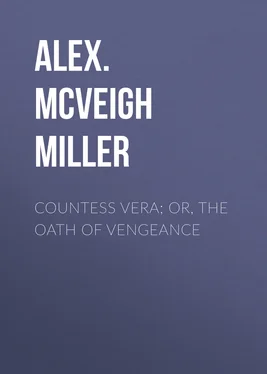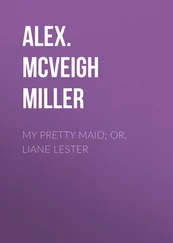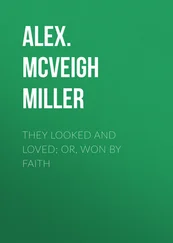Alex. McVeigh Miller - Countess Vera; or, The Oath of Vengeance
Здесь есть возможность читать онлайн «Alex. McVeigh Miller - Countess Vera; or, The Oath of Vengeance» — ознакомительный отрывок электронной книги совершенно бесплатно, а после прочтения отрывка купить полную версию. В некоторых случаях можно слушать аудио, скачать через торрент в формате fb2 и присутствует краткое содержание. Жанр: foreign_prose, foreign_antique, на английском языке. Описание произведения, (предисловие) а так же отзывы посетителей доступны на портале библиотеки ЛибКат.
- Название:Countess Vera; or, The Oath of Vengeance
- Автор:
- Жанр:
- Год:неизвестен
- ISBN:нет данных
- Рейтинг книги:5 / 5. Голосов: 1
-
Избранное:Добавить в избранное
- Отзывы:
-
Ваша оценка:
- 100
- 1
- 2
- 3
- 4
- 5
Countess Vera; or, The Oath of Vengeance: краткое содержание, описание и аннотация
Предлагаем к чтению аннотацию, описание, краткое содержание или предисловие (зависит от того, что написал сам автор книги «Countess Vera; or, The Oath of Vengeance»). Если вы не нашли необходимую информацию о книге — напишите в комментариях, мы постараемся отыскать её.
Countess Vera; or, The Oath of Vengeance — читать онлайн ознакомительный отрывок
Ниже представлен текст книги, разбитый по страницам. Система сохранения места последней прочитанной страницы, позволяет с удобством читать онлайн бесплатно книгу «Countess Vera; or, The Oath of Vengeance», без необходимости каждый раз заново искать на чём Вы остановились. Поставьте закладку, и сможете в любой момент перейти на страницу, на которой закончили чтение.
Интервал:
Закладка:
"Nella will be here in a moment," explains Sir Harry. "She has gone to hurry up her brother, over whom the children are having no end of a jollification. Oh, I forgot, you may not know whom I am talking about. Lady Clive's brother arrived this evening, and will accompany us to Lady Ford's ball."
Vera bows silently, and presently Lady Clive sails in, proudly, with the truant in tow. Evening dress is marvelously becoming to the handsome soldier. Involuntarily Vera thinks of Sir Launcelot:
"The goodliest man that ever among ladies sat in hall,
And noblest."
"Lady Vera, this is my brother, Captain Lockhart," Lady Clive begins, with conscious pride; then pauses, disconcerted by the "still, soft smile" creeping over either face.
"We have met before," Lady Vera explains, with, for her, unusual graciousness. "Met before! Not in America?" cried Lady Clive, bewildered.
"Oh, no," her brother answers, and Lady Vera adds, smiling: "In the nursery, ten minutes ago."
So there is only the earl to introduce, and then they are whirled away to Lady Ford's, where Captain Lockhart meets a score of last season's friends, and to the surprise of Lady Vera, who is prejudiced against almost anything American, he develops some of the graces of a society man, even playing and singing superbly in a full, rich tenor voice.
"Yet, why should he have selected that old, old song: 'The Banks of Allan Water?'" Lady Vera asks herself, scornfully, "and when he sang:
"'For his bride a soldier sought her,'
why should he have looked so straight at me ? It was not an impertinent look, I own, but why should he have looked at me at all?"
But even to her own heart, Lady Vera will not own that her great vexation is directed against herself because she has blushed vividly crimson under that one look from Captain Lockhart's blue eyes, while her heart has beat so strangely—with annoyance, she thinks.
"I foresee that I shall hate this American soldier," she muses, "and no wonder at all when I shall be forced to see him every day. I wish now that we had not accepted Lady Clive's invitation for the London season."
CHAPTER XI
The day after Lady Ford's ball dawns cheerlessly. It is cool, and the air is full of floating mists. The gentlemen determine to go out anyhow. The ladies elect to remain at home. The glowing fire in the library has more charms than the bleak, spring air.
"I am not surprised at Nella," says Captain Lockhart, leisurely buttoning his overcoat. " She was raised in America, and our ladies do not walk much. But I have been told that English ladies walk every morning, whether rain or shine. Are you false to the tradition, Lady Vera?"
The color flies into her cheek at his quizzical glance, but she will not tell him what she sees he does not know—that she has been raised in America, too.
"I suppose so," she says, a little shortly, in answer to his question.
"Suppose you come with us for a turn around the square, my dear?" suggests the earl.
"So I will," answers Lady Vera, determined to have Captain Lockhart see that she is quite English in her habits.
She comes down in a moment covered almost to the pink tips of her ears in rich velvet. To her dismay Earl Fairvale strolls forward in a fit of absent-mindedness with Sir Harry, leaving her to be accompanied by the American soldier. She sees no other course but to accept the situation.
"It is only for a few minutes at the worst," she thinks to herself.
So she walks on by his side, looking so pretty with the nipping wind kissing her cheeks into a scarlet glow, that Captain Lockhart can scarcely keep the admiration out of his eyes.
"The loveliest girl I have ever seen in my life," he mentally decides. "But, by Jove! as cold and proud as an iceberg!"
"So you do not like Americans?" he says to her, regretfully, as they turn a corner.
"No," curtly.
"Ah, but, Lady Vera, is that fair?" plaintively. "You do not know us, yet you condemn us without a hearing. Mere English prejudice—is it not?"
She looks around at the handsome face, full of fire and life, and the sparkling blue eyes. The thoughtful gravity on the lovely face grows deeper. The dark eyes flash.
"Captain Lockhart, you are talking of what you do not understand," she says, impatiently.
"I beg your pardon, Lady Vera," he answers, flushing, "I spoke from the merest impulse. I thought—since you are so very young—you could not know my country well."
Lady Vera blushes, but holds her peace. Of course, somebody will tell him her story soon—tell him that her mother was American, and that she herself had spent seventeen years in his own native land. At least he shall not hear it from her. She has a vague notion that it would please him to know it, that the blue eyes whose sparkle she has already learned to know, would light with pleasure at the knowledge.
Those eyes, how bright and keen they are. They seem to read one's thoughts. Lady Vera finds her gaze drooping from them as they never drooped before mortal man's before. Why? she asks herself.
"It is because he is so bold," she decides, vexedly. "He seems to be trying to read one's inmost thoughts. I will show him that I am not afraid of him."
Thereupon she lifts the dark eyes bravely to give him a cool society stare, but in an instant they waver and fall before the glance they have surprised in his. Just so the blue eyes had turned on her last night, when he sang:
"On the banks of Allan Water,
When the sweet spring tide did fall,
Was the miller's lovely daughter,
Fairest of them all!
For his bride a soldier sought her,
And a winning tongue had he,
On the banks of Allan Water
None so gay as she."
"Why do you stare at me so ?" she breaks out, angry with herself, and with him.
He flushes, startled by her brusquerie .
"I beg your pardon—I did not mean to be rude," he answers, quietly. "But, Lady Vera, a man must be blind not to look at you ."
"Why?" she asks, still sharply.
"Because I think God made all beautiful things for the pleasure of men's eyes," he answers, firmly, yet respectfully.
"Impertinent!" Vera says to herself, indignantly, and looks another way.
"Do you lay an embargo on my eye-sight as far as you are concerned, Lady Vera?" he continues, after a moment.
"Yes," she replies, with her head still turned away.
"Then I shall try to obey you," he answers, calmly. "I will not even see you when I can help it, but you must forgive me for saying that if I should never see you again I shall never forget a single line of your face."
"I hope he is not making love to me," Lady Vera says to herself, uneasily, then laughing at herself. "Of course not; I dare say he has a sweetheart in his own land, some dear, sweet, angelic creature, like Ivy Cleveland, perhaps."
They speak no more, and when they have gone once around the square, Captain Lockhart leaves the earl's daughter at the door with a low bow. She goes into the house, her cheeks tingling with an odd kind of shame.
"I was rude, perhaps ," she thinks, a little uneasily. "What must he think of English manners? But then why did he look at me so? I felt so—so strangely."
To Lady Clive, who is trifling over a bit of fancy work, she says, presently:
"Why did you not tell me you expected your brother?"
Lady Clive glances up under her long lashes at the flushed face, a gleam of mischief in the blue eyes so much like her brother's.
"It was just like me—to forget it," she exclaims. "But then I knew you would not be interested. And, besides, I knew he would not be in your way. Phil is only a plain, blunt soldier—not at all a ladies' man."
Читать дальшеИнтервал:
Закладка:
Похожие книги на «Countess Vera; or, The Oath of Vengeance»
Представляем Вашему вниманию похожие книги на «Countess Vera; or, The Oath of Vengeance» списком для выбора. Мы отобрали схожую по названию и смыслу литературу в надежде предоставить читателям больше вариантов отыскать новые, интересные, ещё непрочитанные произведения.
Обсуждение, отзывы о книге «Countess Vera; or, The Oath of Vengeance» и просто собственные мнения читателей. Оставьте ваши комментарии, напишите, что Вы думаете о произведении, его смысле или главных героях. Укажите что конкретно понравилось, а что нет, и почему Вы так считаете.












